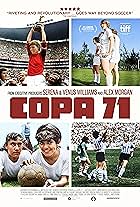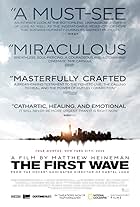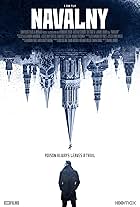Adicionar um enredo no seu idiomaExplores the tennis career of Arthur Ashe and his impact on tennis and HIV activism.Explores the tennis career of Arthur Ashe and his impact on tennis and HIV activism.Explores the tennis career of Arthur Ashe and his impact on tennis and HIV activism.
- Prêmios
- 2 vitórias e 4 indicações no total
Fotos
Tiana Melvina
- Church Member
- (as Tiana Melvina Woods)
Enredo
Você sabia?
- ConexõesReferences Cidadão Kane (1941)
Avaliação em destaque
Greetings again from the darkness. Growing up, I loved watching Jimmy Connors and John McEnroe play tennis. Their talent was unmistakable and they had a certain flair for dramatic moments. But even as a kid, I was more drawn to the personalities of Bjorn Borg and Arthur Ashe - two champions who carried themselves with a quiet dignity and respect for the game and their opponents. They acted like grown-ups, not petulant kids. It wasn't until later that I really understood the obstacles Ashe faced, and co-directors Rex Miller and Sam Pollard expertly handle this remarkable man's story.
Ashe's championship at Wimbledon in 1975 was likely the peak of his tennis career, yet not of his impact on society. It took more than a trophy for him to be labeled "the Jackie Robinson of Tennis". The film takes us back to his childhood in Richmond, Virginia, described here as 'the heart of Confederacy'. Many of those memorial statues that stood when Ashe was young have now been removed, but at the time, he accepted that his tennis playing was limited to the court at the public park next to his house. It wasn't until Althea Gibson's mentor, Dr. Johnson, brought Ashe into the fold that he began to hone his talent, as well as his demeanor.
Against the odds, Ashe was awarded a tennis scholarship to UCLA in 1966, and there is some terrific footage and photographs of him on campus. Ashe later served in the US Army, and won the 1968 US Open. Some of the archival footage stands on its own, and especially insightful are the numerous interviews where we get to hear Ashe in his own words. Of course, others also have much to say, including his brother Johnnie, and Civil Rights activists Harry Edwards, (Olympian) John Carlos, and (US diplomat) Andrew Young. Tennis players Billie Jean King and John McEnroe also offer personal memories.
This is not really a tennis documentary, but it's quite interesting to hear Ashe reveal the "why" behind his strategy against the aggressive Jimmy Connors at Wimbledon. Ashe was also a dynamic supporter of the Davis Cup and believed playing for one's country was an honor. Of course, Arthur Ashe is remembered as a tennis player and Human Rights Activist. He pushed to play in South Africa while Nelson Mandela was imprisoned to show the population what a free black man could do. He and Mandela later became friends. The personality contrast is also distinct between Ashe and fellow sports activists like Muhammad Ali and Lew Alcindor/Kareem Abdul-Jabbar, and it's pointed out that although the approaches differed, Ashe's words carried significant weight. This is quite apparent in the clip of the roundtable discussion featuring Ashe, Harry Edwards, and Jackie Robinson, amongst others. The respect for Ashe is evident.
Genetics caused a heart attack at the early age of 36, and blood transfusions during his medical procedures led to his being HIV-positive. As you would expect, Ashe turned his attention to raising money and awareness for AIDS research, all while never losing his elegance and grace. It seems fitting that the story of Arthur Ashe is being told at the same time KING RICHARD is playing in theaters. Ashe clearly opened the door for black athletes like Venus and Serena Williams, and also inspired their activism, as well as that of athletes in other sports. The video footage and interviews allow this story to be told, and it leaves us with the message that Ashe never forgot his race ... the human race.
In theaters and On Demand beginning December 3, 2021.
Ashe's championship at Wimbledon in 1975 was likely the peak of his tennis career, yet not of his impact on society. It took more than a trophy for him to be labeled "the Jackie Robinson of Tennis". The film takes us back to his childhood in Richmond, Virginia, described here as 'the heart of Confederacy'. Many of those memorial statues that stood when Ashe was young have now been removed, but at the time, he accepted that his tennis playing was limited to the court at the public park next to his house. It wasn't until Althea Gibson's mentor, Dr. Johnson, brought Ashe into the fold that he began to hone his talent, as well as his demeanor.
Against the odds, Ashe was awarded a tennis scholarship to UCLA in 1966, and there is some terrific footage and photographs of him on campus. Ashe later served in the US Army, and won the 1968 US Open. Some of the archival footage stands on its own, and especially insightful are the numerous interviews where we get to hear Ashe in his own words. Of course, others also have much to say, including his brother Johnnie, and Civil Rights activists Harry Edwards, (Olympian) John Carlos, and (US diplomat) Andrew Young. Tennis players Billie Jean King and John McEnroe also offer personal memories.
This is not really a tennis documentary, but it's quite interesting to hear Ashe reveal the "why" behind his strategy against the aggressive Jimmy Connors at Wimbledon. Ashe was also a dynamic supporter of the Davis Cup and believed playing for one's country was an honor. Of course, Arthur Ashe is remembered as a tennis player and Human Rights Activist. He pushed to play in South Africa while Nelson Mandela was imprisoned to show the population what a free black man could do. He and Mandela later became friends. The personality contrast is also distinct between Ashe and fellow sports activists like Muhammad Ali and Lew Alcindor/Kareem Abdul-Jabbar, and it's pointed out that although the approaches differed, Ashe's words carried significant weight. This is quite apparent in the clip of the roundtable discussion featuring Ashe, Harry Edwards, and Jackie Robinson, amongst others. The respect for Ashe is evident.
Genetics caused a heart attack at the early age of 36, and blood transfusions during his medical procedures led to his being HIV-positive. As you would expect, Ashe turned his attention to raising money and awareness for AIDS research, all while never losing his elegance and grace. It seems fitting that the story of Arthur Ashe is being told at the same time KING RICHARD is playing in theaters. Ashe clearly opened the door for black athletes like Venus and Serena Williams, and also inspired their activism, as well as that of athletes in other sports. The video footage and interviews allow this story to be told, and it leaves us with the message that Ashe never forgot his race ... the human race.
In theaters and On Demand beginning December 3, 2021.
- ferguson-6
- 2 de dez. de 2021
- Link permanente
Principais escolhas
Faça login para avaliar e ver a lista de recomendações personalizadas
- How long is Citizen Ashe?Fornecido pela Alexa
Detalhes
Bilheteria
- Faturamento bruto mundial
- US$ 300
- Tempo de duração1 hora 34 minutos
- Cor
- Mixagem de som
Contribua para esta página
Sugerir uma alteração ou adicionar conteúdo ausente

Principal brecha
By what name was Cidadão Ashe (2021) officially released in Canada in English?
Responda























